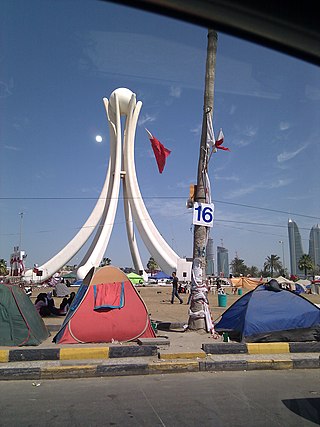
Manama is the capital and largest city of Bahrain, with an approximate population of 200,000 people as of 2020. Long an important trading center in the Persian Gulf, Manama is home to a very diverse population. After periods of Portuguese and Persian control and invasions from the ruling dynasties of Saudi Arabia and Oman, Bahrain established itself as an independent nation in 1971 after a period of British hegemony.

Bahrain plays a modest, moderating role in regional politics and adheres to the views of the Arab League on Middle East peace and Palestinian rights. Since achieving independence in 1971, Bahrain has maintained friendly relations with most of its neighbours and with the world community. It generally pursues a policy of close consultation with neighbouring states and works to narrow areas of disagreement.
Umm Al Hassam is a middle-class neighbourhood on the southern coast of Manama, which is the capital of Bahrain. The neighborhood is home to the majority of Bahrain's local Jewish community. It consists of a mixture of grand villas and newer apartment buildings, and is well known for its Lebanese and Indian restaurants.
The culture of Bahrain is part of the historical region of Eastern Arabia. Thus, Bahrain's culture is similar to that of its Arab neighbours in the Persian Gulf region. Bahrain is known for its cosmopolitanism, Bahraini citizens are very ethnically diverse. Though the state religion is Islam, the country is tolerant towards other religions: Catholic and Orthodox churches, Hindu temples as well as a (now-defunct) Jewish synagogue are present on the island.
Houda Ezra Ebrahim Nonoo served as the Bahraini Ambassador to the United States from 2008 to 2013. She was appointed to the position by decree of Foreign Affairs Minister Khaled Ben Ahmad Al-Khalifa. Nonoo is the first Jew, and third woman, to be appointed ambassador of Bahrain. She is also the first Jewish ambassador of any Middle Eastern Arab country, and the first female Bahraini ambassador to the United States.

Ebrahim Daoud Nonoo is a Bahraini businessman. He sat in the appointed upper house of the Bahraini Parliament's Shura Council between 2001 and 2006, the first and only Jewish member of the council. He is the current CEO of the Basma Company and president of the Association of Gulf Jewish Communities (AGJC)

Bahraini Jews constitute one of the world's smallest Jewish communities, although its origins go back to late antiquity. Talmudic sources refer to ports and islands on the Persian Gulf, indicating that Jews may have already settled in this region. Arabic sources record Jews in the old capital of Bahrain, Hajar, at the time of the Islamic conquest in 630 C.E. In the 12th century, the Jewish traveler-adventurer Benjamin of Tudela mentions 500 Jews living in Qays, and 5,000 in Al-Qatîf, involved in pearl fishery. In the 19th century, there were Jewish merchants from Iraq, Persia, and India in Bahrain.

Manama Club is a Bahraini professional football club, founded in 1946 and based in Manama, that competes in the Bahraini Premier League, the top flight of Bahraini football.
Bahrain is a nation in the Persian Gulf, in a strategical position in relation to the eastern coast of the Arabian Peninsula, Iran, Iraq and Oman.
The history of the Jews in the United Arab Emirates describes the historical and modern presence of Jews over the millennia in the Middle East and the recorded meetings with Jewish communities in areas that are today in the geographic territories of the United Arab Emirates.

The history of the Jews in the Arabian Peninsula dates back to Biblical times. The Arabian Peninsula is defined as including the present-day countries of Bahrain, Kuwait, Oman, Qatar, Saudi Arabia, United Arab Emirates and Yemen politically and parts of Iraq and Jordan geographically.

Bahrain, officially the Kingdom of Bahrain, is an island country in Western Asia. It is situated on the Persian Gulf, and comprises a small archipelago made up of 50 natural islands and an additional 33 artificial islands, centered on Bahrain Island which makes up around 83 percent of the country's landmass. Bahrain is situated between Qatar and the northeastern coast of Saudi Arabia, to which it is connected by the King Fahd Causeway. According to the 2020 census, the country's population numbers 1,501,635, of whom 712,362 are Bahraini nationals. Bahrain spans some 760 square kilometres (290 sq mi), and is the third-smallest nation in Asia after the Maldives and Singapore. The capital and largest city is Manama.

Relations have existed between Bahrain and Israel since Bahrain achieved its independence in 1971. In recent years, relations between the two countries have been thawing, and the countries agreed to establish diplomatic relations in September 2020. The foreign minister of Bahrain Khalid bin Ahmed Al Khalifa has been quoted saying "Israel is part of the heritage of this whole region, historically. So, the Jewish people have a place amongst us." The common threat of Iran has provided common ground for a thaw in what were once tense relations. Bahrain's foreign policy traditionally supports the creation of an independent Palestinian state.

The GCC Roundabout, known as Pearl Roundabout or Lulu Roundabout (Arabic: دوار اللؤلؤ Dawwār al-luʾluʾ , "Roundabout of the pearl " was a roundabout located near the financial district of Manama, Bahrain. The roundabout was named after the pearl monument that previously stood on the site and was destroyed on 18 March 2011 by government forces as part of a crackdown on protesters during the Bahraini uprising of 2011.

In the wake of the 1947–48 Civil War in Mandatory Palestine, a riot against the Jewish community of Manama, in the British Protectorate of Bahrain, on December 5, 1947. A mob of Iranian and Trucial States sailors ran through the Manama Souq, looted Jewish homes and shops, and destroyed the synagogue. One Jewish woman died; she was either killed or died from fright.
Al-Arab was a short-lived Arabic-language news channel which vowed to practice objective journalism. It was launched on 1 February 2015 and almost immediately shut down. The channel was owned by Saudi prince and entrepreneur Al-Waleed bin Talal, and was based in Manama, Bahrain.

The following is a timeline of the Bahraini uprising from February to March 2011, beginning with the start of protests in February 2011 and including the Saudi and Emirati-backed crackdown from 15 March.
Nancy Dinah Elly Khedouri is a Bahraini politician, businesswoman and writer. She has been a National Assembly of Bahrain member since 2010.

Historic and current bilateral relationship exist between Bahrain and Japan. Diplomatic relations were first established in 1972, and since then they have had increasing economic, cultural, and military cooperation, with Japan becoming one of the major trading partners of Bahrain. Several high-level official visits have taken place, including by King Hamad bin Isa Al Khalifa to Japan in 2012, Crown Prince Salman in 2013, and Prime Minister Shinzo Abe to Bahrain in 2013, with the governments of both countries expressing their intent to continue to increase their bilateral relations.
Sharaka is a non-profit and non-governmental organization established in 2020 by people from Israel, The United Arab Emirates, and Bahrain after the signing of The Abraham Accords. The stated mission of the organization is to develop bonds between young Israeli and Gulf leaders, in order to strengthen peace, trust, and cooperation between the respective societies. The organization presently has three operational divisions located in Israel, Bahrain, and the United Arab Emirates.












